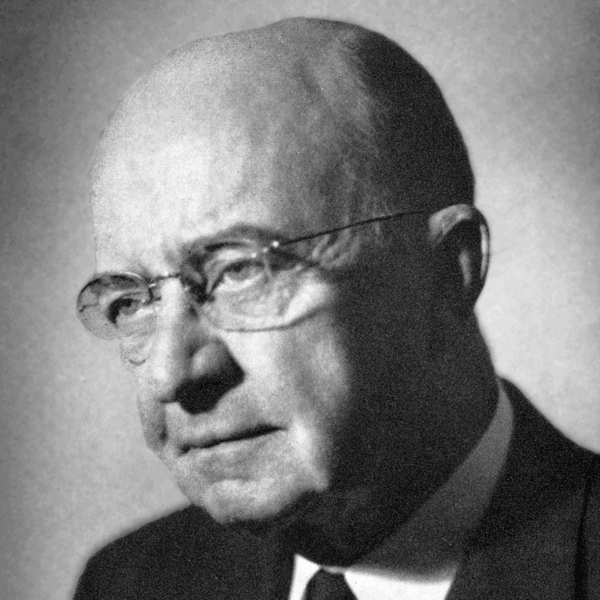Presidential Address
In Memoriam
From the American Historical Review 68:4 (July 1963)
Walter Prescott Webb (April 3, 1888–March 8, 1963) was professor of history at the University of Texas. Webb, president of the American Historical Association for 1957–58, was killed in a one-car accident near his home town of Austin, Texas, the night of March 8. He was one month short of his seventy-fifth birthday. A native Texan, Webb pursued an unorthodox and somewhat delayed road to historical distinction. Reared amid semifrontier, semiarid conditions in west Texas, he had less than four years of formal schooling when he became a teenage teacher in a one-room country school. For the next dozen years he progressed up the public-school ladder, alternating with periods at the University of Texas whenever his funds would suffice, until at twenty-eight he received his bachelor’s degree. From a San Antonio high school he was called to the university in 1918 to instruct students in the teaching of history in the public schools. For the next forty-five years he was to be a vital part of the academic scene at Texas, holding all the ranks through Distinguished Professor. At his death he was on modified service with Texas, but was working full time under a foundation grant to video-tape the story of American civilization as seen by its principal interpreters.
Because of his frontier writings Webb is often classified as a disciple of Frederick Jackson Turner, though he was quick to point out that he deliberately avoided reading anything by Turner until after he had published his own ideas in The Great Plains (1931), his first book, which he once described as “an autobiography with scholarly trimmings.” His next book, The Texas Rangers (1935), has long been accepted as the definitive study of that frontier law enforcement body; aside from his textbooks it is the only traditionally styled book he wrote. In 1937 he brought out Divided We Stand, in which he attempted to show the vassalage of the South and West to the North; the book still sparks controversy. His final major work, The Great Frontier, in which Webb tried to trace the effect of the opening of the New World on Western civilization has, likewise, met mixed reaction. In all his works Webb seemed to care less whether critics accepted him than whether he stimulated thought; in this approach he was undoubtedly successful. Aside from his original approach to history, he was remarkable as a man. Too many honors came his way to list here, although among them were the Loubat Prize, a Harmsworth professorship at Oxford, and a ten-thousand-dollar grant from the American Council of Learned Societies for a lifetime of distinguished contribution to American scholarship. He was also quite proud of being the only President of the American Historical Association elected while teaching in a southern institution or while a resident teacher west of the Mississippi River.
Bibliography
The growth of a nation: the United States of America, by Eugene C. Barker, Walter P. Webb, and William E. Dodd; art work by Dorothy Handsaker. Evanston, Ill.: Row, Peterson, 1928.
The Great Plains, by Walter Prescott Webb. Boston: Ginn, 1931; Reprint, Lincoln: University of Nebraska Press, 1981.
The Texas rangers; a century of frontier defense; illustrated with drawings by Lonnie Rees and with photographs. Boston, New York: Houghton Mifflin, 1935.
Divided we stand; the crisis of a frontierless democracy, by Walter Prescott Webb. New York, Toronto: Farrar & Rinehart, 1937.
Our nation grows up, by Eugene C. Barker, William E. Dodd, and Walter P. Webb. Evanston, Ill., New York: Row, Peterson, 1938.
The building of our nation, Evanston, Ill., New York: Row, Peterson, 1941.
The story of our country. Evanston, Ill., New York: Row, Peterson, 1941.
The Great Frontier. Boston: Houghton Mifflin, 1952; Reprint with an introduction by Arnold J. Toynbee. University of Nevada Press pbk. ed. Reno: University of Nevada Press, 2003.
More water for Texas: the problem and the plan. Austin: University of Texas Press, 1954.
The story of the Texas Rangers. Illustrated by Nicholas Eggenhofer. New York: Grosset & Dunlap, 1957.
An honest preface, and other essays. With an appreciative introd. by Joe B. Frantz. Boston: Houghton Mifflin, 1959.
History as high adventure. Edited with an introd. by E. C. Barksdale. Austin: Publication of the Jenkins Garrett Foundation by Pemberton Press, 1969.
The Texas Rangers in the Mexican War, by Walter Prescott Webb. Austin: J. Garrett Press, c1975.
